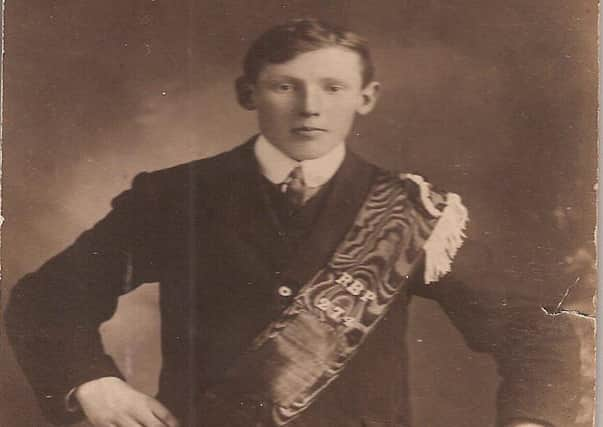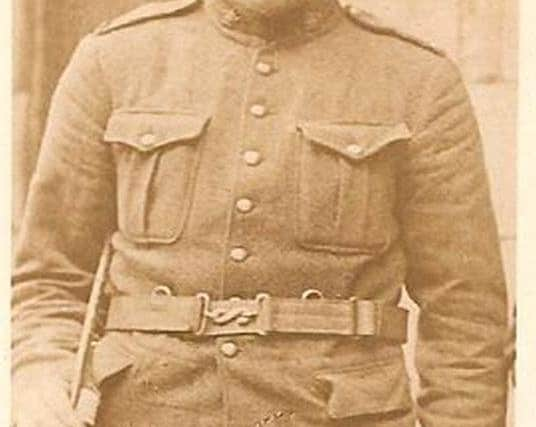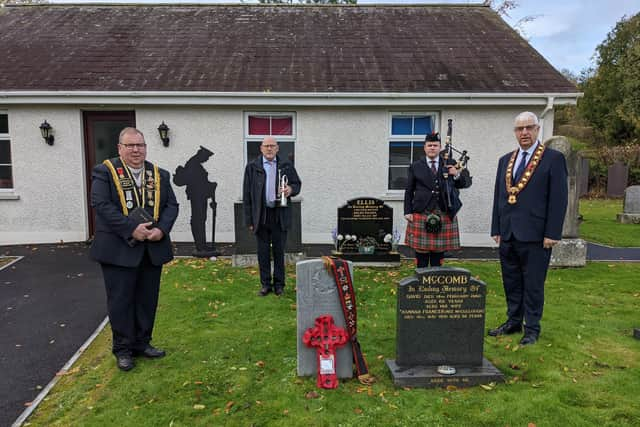Dream of new life in Canada ended on WWI battlefield for brave Sir Knight from Co Armagh


His tragic death three years later during the conflict of World War One highlights the selfless sacrifice made by thousands of young men like Thomas.
Lance Corporal Thomas McCullough died from his wounds after fighting in the Battle of the Ancre Heights and is buried at Mountnorris Presbyterian Church.
Advertisement
Hide AdAdvertisement
Hide AdHe was a member of the Royal Black Institution, having joined Mountnorris RBP 274 before emigrating to Montreal in 1913.


His story has been brought to light by Rev Nigel Reid, the minister of Mountnorris and Tullyallen Presbyterian Churches and Imperial Grand Chaplain of the Royal Black Preceptory.
Rev Reid’s interest was piqued when he noticed that Mountnorris had a World War One Commonwealth War Grave.
After he got speaking with some of Thomas McCullough’s descendants and discovered that the Great War soldier had also been a member of the Royal Black Institution, Rev Reid was hooked on researching the story even further.
Advertisement
Hide AdAdvertisement
Hide AdHe said: “Thomas McCullough was born on March 20, 1895 into the home of Thomas James and Susan McCullough from Tullyallen House, Mountnorris in Co Armagh.


“Early life for Thomas was spent at Tullyallen House, attending Derrycughan Primary School (now part of Markethill Primary School) and also in the townland of Ballygorman with his grandmother.
“Thomas was the second of six children. He attended Sunday School and Church here in Mountnorris.”
Rev Reid said that from talking to his descendants, some of whom are members of the church, it was clear that family meant a lot to Thomas.
Advertisement
Hide AdAdvertisement
Hide AdHe continued: “It would seem that Thomas had worked as a labourer. Thomas was involved in various things in the community. He was a member of Mountnorris Orange Lodge and Royal Black Preceptory.”
In 1913 Thomas became one of the 4.5 million men and women who left Ireland for a new life overseas over a 60 year period.
Rev Reid said: “In March 1913 Thomas McCullough was to walk down the lane of Tullyallen House for the last time and leave his family and home behind to make his way to the port of Londonderry take a ship to a new life.
“As he would travel I believe that Thomas took with a deep love for his family and this part of Co Armagh.
Advertisement
Hide AdAdvertisement
Hide Ad“At the port of Londonderry Thomas purchased a third class ticket – number 4812 – on a ship called the SS Scotian bound for Halifax in Canada and Boston in America.
“From the passenger list we know that it was his desire to make Montreal (in the province of Quebec) his permanent residence.
“There were 305 souls that boarded the Scotian that day for a new life – 262 for Canada and 43 for the USA.
“Thomas sailed from Londonderry on March 22, 1913 Thomas sailed out of Londonderry, leaving Ireland for a new life.
Advertisement
Hide AdAdvertisement
Hide Ad“Nine days later Thomas, on March 31, 1913 Thomas sent a message home to Mountnorris that he had safely arrived in Halifax, Canada.”
Rev Reid did some research into the Canadian city of Montreal where Thomas emigrated to: “In 1911 we know that there were 470,480 living in the city. We also know that the Montreal Street Railway Co, the carter’s wagon and the horse and carriage were the only means of transportation.
“In 1899 there were 3,000 horse stables and 500 cow stable within city limits. Horses and carriage we still important in Montreal for Thomas was to take up employment in Montreal as a teamster.
“Teamsters were the men who drove horse-drawn wagons and formed the backbone of North America’s wealth and prosperity. They worked long hours, maybe 12 to 18 Hours a day – it was hard work.”
Advertisement
Hide AdAdvertisement
Hide AdOn Tuesday, August 4, 1914 life for Britain and its Empire was to change with the start of World War One.
Canada was to fully support the war effort with thousands of young men answered the call to join the army when it came.
Rev Reid said: “Thomas McCullough responded to that call on October 23, 1914, presenting himself at a recruiting office in Montreal.
“He was assigned to the 24th Battalion Victoria Rifles of Canada – an Infantry Regiment that was a part of the Canadian Expeditionary Force.
Advertisement
Hide AdAdvertisement
Hide Ad“Following his enlistment extensive training began for Thomas and his colleagues.
“On the May 10, 1915 Thomas and the 24th Battalion Victoria Rifles of Canada boarded a ship called the SS Cameronia and sailed for England to train in the Sandling Camp. One soldier wrote a poem about the camp.”
He continued: “Life was to get more difficult for Thomas and his regiment when on September 16, 1915 they sailed to France and disembarked at Boulogne. Thomas was to experience the most horrific events on a scale never seen in the world before.
“But those who loved him kept in touch and Thomas kept in touch with them also.
Advertisement
Hide AdAdvertisement
Hide Ad“Thomas was sent to the trenches and by October 27, 1915 he was suffering. He was diagnosed with trench foot – a medical condition caused by prolonged exposure of the feet to damp, unsanitary, and cold conditions.
“1916 was not easy for Thomas either. He contracted German measles in April of that year.”
Sadly for Thomas things would get much worse. On June 16, 1916 Thomas was wounded and the following day he 17th June he experienced shell concussion from an explosion.
Rev Reid said: “Amazingly by June 28, 1916 Thomas was back in the trenches fighting along side his comrades.
Advertisement
Hide AdAdvertisement
Hide Ad“October 10, 1916 was a fateful day for Thomas during the Battle of the Ancre Heights. That day Thomas was to receive a femur fracture in the battlefield.”
The Battle of the Ancre Heights took place from October 1 to November 11, 1916.
It was fought after Field Marshall Douglas Haig made plans for the Third Army to take the area east of Gommecourt. The Reserve Army attacked to complete the capture of Regina Trench during which bad weather caused great hardship and delay.
The Marine Brigade from Flanders and fresh German divisions brought from quiet fronts counter-attacked frequently and the British objectives were not secured until November 11.
Advertisement
Hide AdAdvertisement
Hide AdRev Reid said: “Taken from the battlefield Thomas was transferred to hospital. By October 12, 1916 he was admitted to the Queen’s Canadian Military Hospital in Kent and on October 16 to the Canadian Military Hospital in Shorncliffe.
“Sadly fighting wounds and Septicaemia, Lance Corporal Thomas McCullough was to lose his earthly life on November 12, 1916 at 9.30pm. His father and brother travelled to Kent and brought his remains back home.”
Sir Knight McCullough was buried on November 18, 1916 at Mountnorris Presbyterian Church with full military honours. The Commonwealth War Graves Commission later erected a headstone to mark his burial place.
Rev Reid said: “I felt it was important to tell the remarkable story of someone who was from our community here in Mountnorris, and who was also a member of the Royal Black Institution.
Advertisement
Hide AdAdvertisement
Hide Ad“Sir Knight McCullough’s generation gave so much, and we must never forget their bravery and sacrifice.”
The leader of the Royal Black Institution has paid tribute to fallen Sir Knight Thomas McCullough.
Sovereign Grand Master, Rev William Anderson, attended an Act of Remembrance at his grave last month.
On behalf of the Institution, Rev Anderson laid a poppy wreath in the shape of Red Cross at the grave.
Advertisement
Hide AdAdvertisement
Hide AdThe event formed part of the Royal Black Institution’s ‘Time to Remember’ season, which over the next few weeks and into the New Year will look back and give thanks for those who paid the supreme sacrifice in defence of democracy and the freedoms we enjoy today.
Rev Anderson said: “It was a truly humbling experience to attend Sir Knight McCullough’s grave and lay a wreath on behalf of the Royal Black Institution. Many members of our Institution have died serving their country in various theatres of war down the decades, and we remember them all with pride.”
The short, socially-distanced Act of Remembrance was organised by Imperial Grand Chaplain Rev Nigel Reid.
A message from the Editor:
Thank you for reading this story on our website. While I have your attention, I also have an important request to make of you.
Advertisement
Hide AdAdvertisement
Hide AdWith the coronavirus lockdown having a major impact on many of our advertisers - and consequently the revenue we receive - we are more reliant than ever on you taking out a digital subscription.
Subscribe to newsletter.co.uk and enjoy unlimited access to the best Northern Ireland and UK news and information online and on our app. With a digital subscription, you can read more than 5 articles, see fewer ads, enjoy faster load times, and get access to exclusive newsletters and content. Visit https://www.newsletter.co.uk/subscriptions now to sign up.
Our journalism costs money and we rely on advertising, print and digital revenues to help to support them. By supporting us, we are able to support you in providing trusted, fact-checked content for this website.
Alistair Bushe
Editor